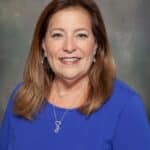NCJWSTL Is Celebrating 125 Years of Creating Programs to Solve Problems

Writing by Ellen Alper. CEO Ellen Alper leads the National Council of Jewish Women-St. Louis Section, a 125-year-old organization with over 5000 members, volunteers and supporters. With 35 years of non-profit management experience, she too is an active community volunteer and serves on a number of boards. Early in her career, she worked in The White House on President Carter’s staff in Washington, D.C.
“What can you do with a $300 microloan? I pondered this question and then developed a plan. In my plan, each financial victory was because of the spiritual, psychological and financial boost from receiving and repaying the microloan.”
“Sometimes all one needs is a chance, and, the microloan provided me with that chance, and for that, I am grateful,” says woman fleeing a situation of domestic abuse.
The National Council of Jewish Women in St. Louis (NCJWSTL) will celebrate its 125th Anniversary this year. As CEO, I am so proud to be at this point in our history; our work and accomplishments speak for themselves and our handprints are on St. Louis: NCJWSTL has a long and rich history, dating back to 1895, of being at the forefront of social change and touching the lives of thousands.
The Healing Hearts Bank was created to solve a problem
Financial issues are one of the main reasons a woman stays with her abuser. Oftentimes, a surprisingly small amount of money can help her make the decision to move on with her life.
Recognizing that services for temporary housing and legal support already existed, NCJWSTL focused on finances. Healing Hearts was developed as a micro-lending program, so that microloans up to $500 with 5% interest could be provided to help women further their financial independence.
Founded in 2011, the Healing Hearts Bank Microlending Program was recognized in 2015 with the What’s Right with the Region Award, by FOCUS St. Louis.
How we “rolled up our sleeves” and made it happen
We saw the pain in women’s faces and were determined to activate other volunteers to join us. Healing Hearts Bank branches now operate through our partnerships with community organizations. We engaged bank volunteers to review loan applications, serve as a resource for program procedures, and support borrowers through their loan process.
All loans are reported to credit agencies in order to help borrowers build credit. Most people don’t fully appreciate that their credit score can impact their ability to rent an apartment or take out a car loan —building credit is significant. We also connect borrowers to traditional banks and credit unions.
Partnerships help new programs be more effective
There is no need to undertake bold goals alone. Over time we’ve looked for collaboration opportunities, and, today, we partner with more than 20 local community organizations to provide microloans to people who may not have access to traditional banking for items related to income generation, credit building and increased self-sufficiency.
Our partners include the YWCA, The Women’s Safe House, Justine Petersen, LifeWise and Better Family Life. As the program has grown, it expanded to include other women and families who are not all survivors of domestic violence—but have had their lives impacted in other ways where a small loan can make a big difference.
Good causes still have to demonstrate return on investment
Since NCJWSTL opened its first Healing Hearts Bank Branch, more than 159 loans have helped borrowers find safe housing, start businesses, improve their credit scores, repay high-interest payday loans, find/support employment and fulfill goals to achieve financial independence.
And the best part is when they pay back the loans, they know the funds become available to lend to someone else—so they are paying it forward.
NCJWSTL has been acting boldly for 125 years
It’s what we do. It’s what our predecessors accomplished. NCJWSTL has worked hard for generations to earn its reputation as a pillar in the community, a change-maker, and an impact-oriented organization. Examples abound.
Our volunteers went into the St. Louis public schools in 1919 to provide a Free Milk Program, and sponsored monthly Luncheons for the Blind in 1923, which became the longest-running community service project.
We established the Council Shop in 1940, known today as The Resale Shop, to provide clothing and items for the public and vouchers for underserved women, refugees and those experiencing life emergencies.
We opened The Delcrest in 1968, known today as the Gladys and Henry Crown Center for Senior Living.
Maybe you want to act boldly; here are five strategies to assess needs
- Look at who else is doing the work you want to do. If you are creating a duplicate program, think twice before you leap.
- If doing something new or similar—are there partners you can identify to work with and to leverage the program?
- Are you taking the social justice approach and talking to the people you want to help instead of thinking you know what’s best for them? The people you want to help should be your allies and partners as you develop a program.
- Identify resources that will support the work you want to do—whether it be financial or human capital. You can’t do it alone.
- Evaluate what you want to do. Can you measure and prove to yourself and others that you are making a difference?
The National Council of Jewish Women in St. Louis (NCJWSTL) celebrates its 125th Anniversary this year (2020). Since 1895, the organization has been at the forefront of social change and touched the lives of women, children and families throughout this region. NCJWSTL offers three special public events to headline the year’s festivities:
- April 23: NCJW Celebrates Women, honoring former Senator Claire McCaskill
- August 16: Day of Giving Back
- October 8: Sisters Act, featuring activist and celebrated actress, Kathy Najimy
- To learn more, please visit ncjwstl.org.
